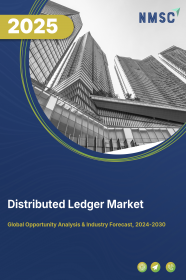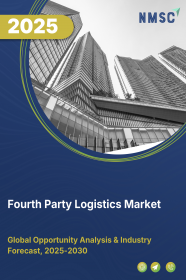
Distributed Ledger Market by Technology (Blockchain, Hashgraph, Holochain, and Others), Component (Hardware, Software, and Services), Organization Size (SMEs and Large Enterprises), Deployment (On-Premise, Cloud, and Hybrid), Application (Payments, Smart Contracts, Supply Chain Management, Compliance Management, Trade Finance, and Others) and Others- Global Opportunity Analysis and Industry Forecast 2024–2030
US Tariff Impact on Distributed Ledger Market
Trump Tariffs Are Reshaping Global Business
Market Overview
The global Distributed Ledger Market size was valued at USD 3.44 billion in 2023, and is predicted to reach USD 103.15 billion by 2030 with a CAGR of 62.55% from 2024-2030. A distributed ledger is a digital system used to record and verify transactions that are spread across a network of computers, rather than being stored in a central location.
Transactions are grouped into blocks, which are then linked together in a chain, creating an immutable record. Distributed ledgers use consensus algorithms to ensure that all copies of the ledger are the same and all transactions are valid, making them resistant to tampering or hacking. Blockchain technology is one of the most widely known and adopted distributed ledger technology.
Market Dynamics and Trends
The demand for the distributed ledger market is on the rise, owing to the growing popularity of blockchain technology across various industries, such as finance, supply chain management, healthcare, and government. Blockchain technology is a type of distributed ledger technology that allows for secure and transparent record-keeping across a network of computers.
In addition, rise in demand for transparency and traceability in supply chain management is further boosting the distributed ledger market growth. Distributed ledger technology allows for real-time tracking and monitoring of products and materials as they move through the supply chain.
This helps to improve efficiency, reduce costs, and increase transparency, which is particularly important in industries such as food and beverage, retail, and pharmaceuticals. Moreover, growth in demand for smart contract-based solutions is fuelling the growth of the distributed ledger market.
This technology enables use of smart contracts, which are self-executing contracts with the terms of the agreement between buyer and seller being directly written into lines of code, which in turn boosts the market growth.
However, distributed ledger technology is not yet fully regulated, and the lack of a legal framework can make it difficult for organizations to adopt it, which may restrain the growth of the distributed ledger market. On the other hand, introduction of new distributed techniques such as sharding is expected to create ample growth opportunities for the market in the future.
Sharding is a technique that allows a blockchain network to be divided into smaller units, called shards, that can process transactions in parallel. This could help to increase the scalability of distributed ledger technology.
Market Segmentation and Scope of Study
The global distributed ledger market report is segmented on the basis of technology, component, organization size, deployment, application, industry vertical, and geography. On the basis of technology, the market is classified into blockchain, hashgraph, holochain, and others. By component, it is segmented into hardware, software, and services. On the basis of organization size, it is categorized into SMEs and large enterprises. On the basis of deployment, it is divided into on-premise, cloud, and hybrid. On the basis of application, the market is categorized into payments, smart contracts, supply chain management, compliance management, trade finance and others. By industry vertical, the market is divided into BFSI, government & public, manufacturing, retail & E-commerce, media & entertainment, transportation & logistics, healthcare, energy & utilities and others. Geographical breakdown and analysis of each of the aforesaid classifications include regions such as North America, Europe, Asia-Pacific, and Rest of the World (RoW).
Geographical Analysis
North America dominates the global distributed ledger market share and is expected to remain dominant throughout the forecast period. This is attributed to rise in number of blockchain-based startups such as Chain and Ripple in the region. These startups are majorly contributing toward the development and adoption of distributed ledger technology in North America, driving innovation, and creating new use cases for blockchain-based solutions.
Moreover, the rising government support for the development and adoption of blockchain technology in providing funding and resources to support research and development in the field is further boosting the growth of the market.
For instance, in June 2020, The Inter-American Development Bank (IDB) and the Office of the Inspector General of Colombia (Procuradura General de Colombia) partnered with the World Economic Forum to lead a multi-stakeholder team that has been looking into, designing, and testing the use of blockchain technology for corrupt government processes, with the use case of public procurement as its foundation.
On the other hand, Europe is expected to witness substantial growth in the global distributed ledger market trend owing to stringent regulations in the region that include General Data Protection Regulation (GDPR) have strengthened the requirement for data to be stored and processed within the European Union, leading to increased demand for distributed cloud solutions that allow companies to store data closer to their customers.
Moreover, distributed cloud technology-equipped medical devices allow health professionals to securely collect and share data with other devices and systems, such as electronic health records (EHRs) and clinical decision support systems. Therefore, the rising investment in medical equipment and technologies in countries including China and Japan is further fuelling the growth of the distributed ledger market. According to International Trade Administration report as of November 2022, Japan’s Ministry of Health, Labour and Welfare (“MHLW”) data show that the Japanese market for medical devices in 2020 totaled USD 38 billion.
Competitive Landscape
Various market players operating in the distributed ledger market include AlphaPoint, Amazon Web Services, Inc., Auxesis Services & Technologies (P) Ltd., Digital Asset Holdings, LLC, Earthport, Huawei Technologies Co., Ltd., Intel Corporation, International Business Machines Corporation, iXledger, and NTT DATA Corporation. These market players are adopting various strategies such as product launch to maintain their dominance in the global market share.
For instance, in January 2023, Amazon Web Services partnered with Ava Labs, to scale blockchain adoption across enterprises, institutions, and governments, the two firms exclusively told TechCrunch.
Moreover, in August 2022, Amazon launched managed blockchain service with the support of Ethereum, hyperledger fabric to manage peer-to-peer payments, process loans and help businesses transact with distributors and suppliers.
Also, in February 2022, Intel Corp launched a new chip for blockchain applications such as Bitcoin mining and minting NFTs to cash in on the rising usage of cryptocurrencies.
Key Benefits
-
The report provides quantitative analysis and estimations of the distributed ledger market from 2024 to 2030, which assists in identifying the prevailing market opportunities.
-
The study comprises a deep dive analysis of the distributed ledger market including the current and future trends to depict prevalent investment pockets in the market.
-
Information related to key drivers, restraints, and opportunities and their impact on the distributed ledger market is provided in the report.
-
Competitive analysis of the players, along with their market share is provided in the report.
-
SWOT analysis and Porters Five Forces model is elaborated in the study.
-
Value chain analysis in the market study provides a clear picture of roles of stakeholders.
Distributed Ledger Market Key Segments
By Technology
-
Blockchain
-
Hashgraph
-
Holochain
-
Others
By Component
-
Hardware
-
Software
-
Services
By Organization Size
-
SMEs
-
Large Enterprises
By Deployment
-
On-Premise
-
Cloud
-
Hybrid
By Application
-
Payment
-
Smart Contracts
-
Supply Chain Management
-
Compliance Management
-
Trade Finance
-
Others
By Industry Vertical
-
BFSI
-
Government & Public
-
Manufacturing
-
Retail & E-Commerce
-
Media & Entertainment
-
Transportation & Logistics
-
Healthcare
-
Energy & Utilities
-
Others
By Region
-
North America
-
The U.S.
-
Canada
-
Mexico
-
-
Europe
-
The UK
-
Germany
-
France
-
Italy
-
Spain
-
Denmark
-
Netherlands
-
Finland
-
Sweden
-
Norway
-
Russia
-
Rest of Europe
-
-
Asia Pacific
-
China
-
Japan
-
India
-
South Korea
-
Australia
-
Indonesia
-
Singapore
-
Taiwan
-
Thailand
-
Rest of Asia Pacific
-
-
RoW
-
Latin America
-
Middle East
-
Africa
-
Key Players
-
AlphaPoint
-
Amazon Web Services, Inc.
-
Auxesis Services & Technologies (P) Ltd.
-
Digital Asset Holdings, LLC
-
Earthport
-
Huawei Technologies Co., Ltd.
-
Intel Corporation
-
International Business Machines Corporation
-
iXledger
-
NTT DATA Corporation
Report Scope and Segmentation:
|
Parameters |
Details |
|
Market Size in 2023 |
USD 3.44 Billion |
|
Revenue Forecast in 2030 |
USD 103.15 Billion |
|
Growth Rate |
CAGR of 62.55% from 2024 to 2030 |
|
Analysis Period |
2023–2030 |
|
Base Year Considered |
2023 |
|
Forecast Period |
2024–2030 |
|
Market Size Estimation |
Billion (USD) |
|
Growth Factors |
Growing popularity of blockchain technology across various industries. Rise in demand for transparency and traceability in supply chain management. |
|
Countries Covered |
28 |
|
Companies Profiled |
10 |
|
Market Share |
Available for 10 companies |
|
Customization Scope |
Free customization (equivalent up to 80 working hours of analysts) after purchase. Addition or alteration to country, regional, and segment scope. |
|
Pricing and Purchase Options |
Avail customized purchase options to meet your exact research needs. |

















 Speak to Our Analyst
Speak to Our Analyst




















